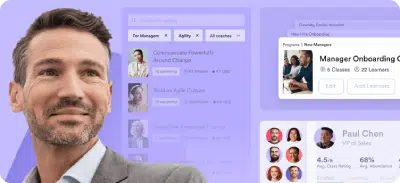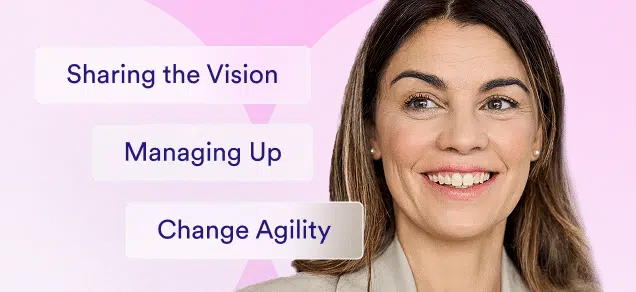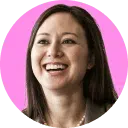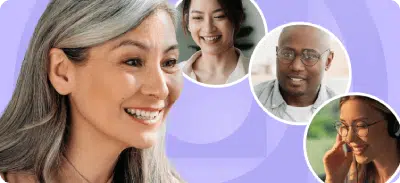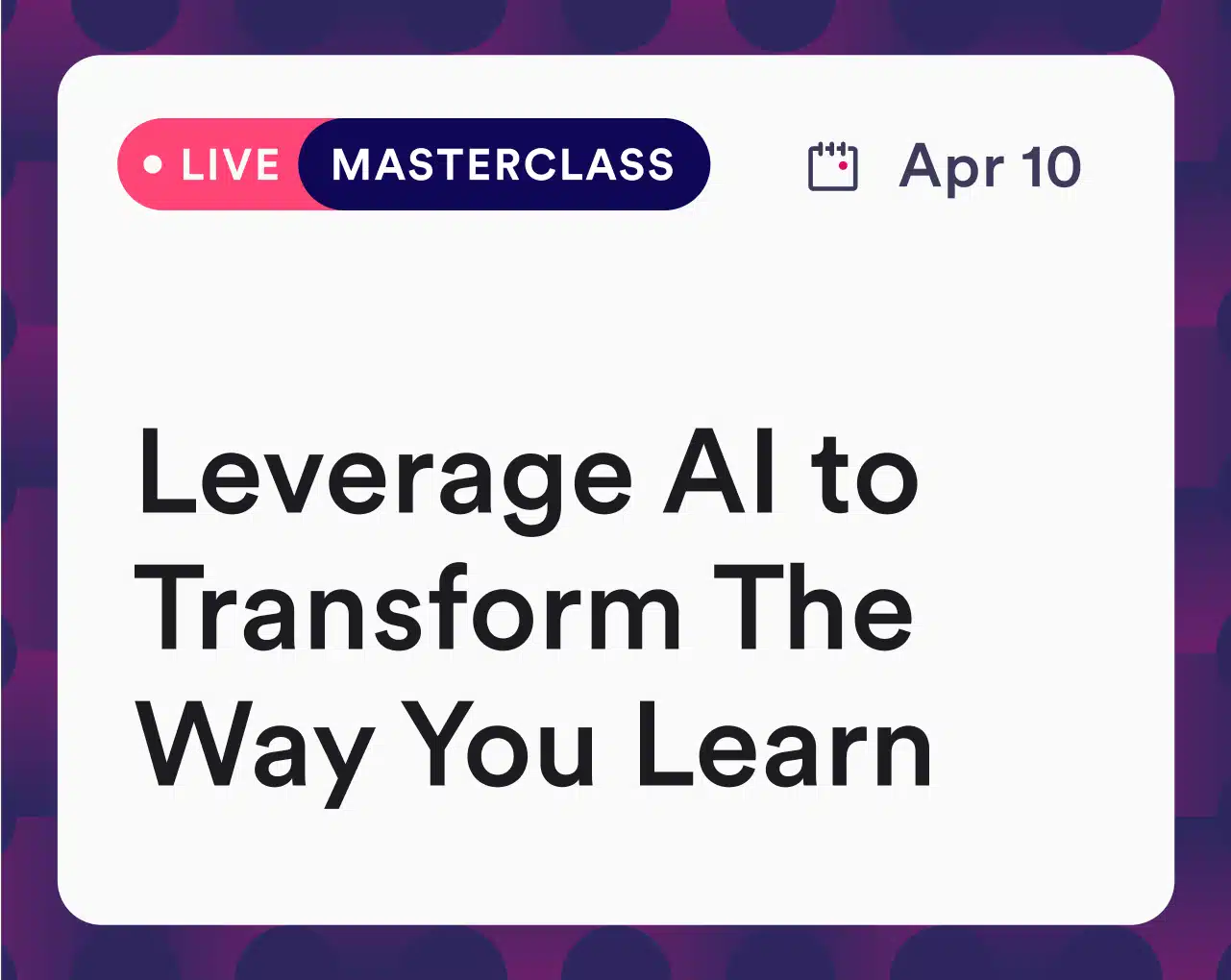Rea Rotholz: Welcome to today's webinar. We're so happy you could join. We're gonna give it a couple minutes for everyone to arrive.
So while you are joining, we do have a question for you all. You can put where you're calling in from because that's always fun. But our question related to today's webinar is if you could wave a magic wand, what's a skill that you would give every senior leader. You can put that in the chat and we can see what you all think, which will be good context for today's topic.
Tom Griffiths: Hey, Diane, all the way from Belize. Great to have you, Evan from Boston. Empathy, that's a great one, especially in challenging times. Kathleen, welcome Olympia. How to give feedback throughout the year and probably not just in feedback cycles. Makes sense. Self-awareness. We'll talk a little bit about that.
That's a, that's an important one. And, a lot of development is contingent on having. An awareness of those blind spots. So yeah, it's a nice call out. San Diego. Michelle, I'm in Carlsbad, so not too far away. I get to see local attendee here. Few coming in from EQ or emotional intelligence.
So important, especially as you go up the the leadership ladder just knowing yourself, knowing others, and knowing how to relate to people. It's more than just the work, so, that, that's great. Yeah, more emotional intelligence all the way from Belgium. Thanks, Tom.
Rea Rotholz: Shows how it's similar topics regardless who you're in the world, right?
We're already seeing that.
Tom Griffiths: Truly, truly well, while you're doing that, not to overload you with a to-do list as you join the webinar, but if you could check out our little QR code on the right hand side. We're gonna do some fun interactive live polling later on the webinar, and we'd love to get you onto that website so that you can participate in those polls.
So please snap the QR code or. Just go to the website at the middle top of the screen there, mentee.com. Enter that code and you'll be able to live poll or respond to our questions as we go through the webinar. Kat loves mentee. Yeah, it's our first time trying it, so bear with us, but it looks pretty cool.
We can do some live polling, just like a game show. It's gonna be great.
Rea Rotholz: Does that mean you're gonna be our game show host?
Tom Griffiths: Yeah, exactly. I'll try. We'll see. Hopefully we, the questions won't be too hard as they come in.
Rea Rotholz: Well, speaking of questions, we can go ahead and get started with some housekeeping notes.
So. Hello everyone. Welcome to today's webinar, rethinking Senior Leader Development, what Works, what Doesn't, and what's coming next. We're so glad that you could join us today. So like Tom mentioned, we are gonna be using menti for polling. So go ahead and pull up menti.com on your web browser. You can use the QR codes.
You, you'll be ready for that. Live transcription is enabled. So if you need to use this feature, you can click on the captions at the bottom of your zoom screen at any time. And we know it's always a question. This webinar will be recorded, so if you have to drop at any point or you have a colleague you know who couldn't make it, no worries.
They will receive the full recording. And also we wanna hear your questions. So Tom and I have a lot of awesome content today, but it's always better when we hear from you as well. So we'll be leveraging the q and a function in Zoom to monitor any questions. So I encourage you to put any questions in that q and a box at the bottom of your screen.
If you put it in the chat, we might miss it 'cause we have almost 150 people already on the line. So put it in the q and a. And with that, let's go ahead and start with some introductions. So who are we? I am Raya Rothell. I lead Hones Learning Solutions team. I've been with the organization for a little over three years now, advising hundreds of customers on their l and d strategies.
And prior to joining Hone I led learning and development at Dow Jones. So parent company, the Wall Street Journal, and some other media publications. So I was on the in-house l and d side before coming over to the consulting side. Really looking forward to chatting more about today's topic around senior leaders.
And with me, I have our CEO Tom and I will let you introduce yourself.
Tom Griffiths: Thanks, Rya. Hey everybody. I'm so grateful to you all for being here with us today to talk about Hones latest offering for senior leaders. I'm co-founder and CEO here at Hone. Been working in this space for seven years, really trying to bring the best of technology together with the best of learning experiences to deliver meaningful development for folks up and down.
An organization. We're gonna dive into a lot of new findings that we have on senior leader research and best practices for designing an experience. But just before we do, I wanted to give you the bird's eye view of who we are here at home. Like I said, we've been around about seven years now and have built up a huge library of different learning experiences, really where we aspire to be your.
All in one employee development partner. Combining the best of live human instruction with the latest in AI technology to really reinforce measurable learning outcomes. We are known historically for our manager development, so have a really deep and powerful curriculum for managers. But one of the audiences we often see our customers struggle to serve in a different way.
Are those senior leaders? The C-Suite gets all of the budget and executive development and coaching. Frontline managers are often top of the to-do list when it comes to training and development roadmaps. And so that layer in between of the VPs, the senior VPs or the directors who are really crucial emerging executives in the company.
Don't often get an experience as tailored to them as it could be. And so that's really what we've been building for the last few quarters here at Hone and they're excited to share with you more today, I. So before we dive in let's get a sense of how things are going for you all in this area of senior leader development.
Now, this is our first mentee poll. So you go to the site at the top and answer this question for us. How effective do you think your current senior leader development initiatives are? We'll give it a minute for the responses to come in, and it's really cool to see that all happen in real time.
Rea Rotholz: I feel like these are our hone color scheme too. I don't know if we picked that, but I like it.
Tom Griffiths: Yeah, the team is misses, no detail. It's great.
Rea Rotholz: And for those of you who might be struggling, Kaitlyn, put in the chat, the links, you could just click on that mentee.com link and enter in the code and then you'll be able to participate as well.
We have 174 people, so. We're gonna wait for this to get up there. So go ahead. Go ahead. Select what fits best for you.
Tom Griffiths: While those continue to come in, I think there's a few obvious emerging patterns here. The first, if we take it from the left is that no one out of our 177 folks online is saying that their senior leader development is very effective.
And so I hope that, whether you work with hone or not. We can share some best practices today that can help elevate that programming and help you feel more confident in it. We've got some folks maybe, a quarter or so who feel like they're somewhat effective. That's good.
But the balance for the folks that are actually doing some kind of development skews towards the not very effective end of the spectrum. So understood on that. That's why we are here. We see that a lot. Oftentimes you don't have the tools at your disposal to do a lot for senior leaders.
Again, there's traditional instruments like coaching or conferences, but not a lot of curriculum designed specifically for this audience. So, we hope that we can help you there. But finally as we are perhaps expecting to see, there's a good chunk of folks also on the far right that don't have any senior leader programs at all.
And again, I think that's a function of not having a ton of great offerings available. Not having a ton of budget, frankly, and bandwidth in these tighter times. And sometimes just, not knowing what these folks need. They are perhaps a difficult audience given their. Their differences and their experience level and sometimes their personalities.
So, not surprising that there's a chunk of folks not doing anything. Ray anything that you'd noticed in this or wanted to comment on?
Rea Rotholz: It's interesting that there's three key categories here where some people who are doing something think it's. Somewhat effective but not very effective.
So we could talk about how might you improve upon what you're doing to make it more effective. Then we have the folks who are doing stuff, but it's, they know it's not effective, and then the don't have senior leaders. I'm not surprised at this at all either, and it's frankly why we are doing today's webinar.
Tom Griffiths: I, I would say the other thing that we know from our conversations with hundreds of talent leaders, and this was true at the Transform Conference last week as well, is there's no lack of desire here. I think folks see this as a real important need that they need to solve for. It's just that we, perhaps haven't figured out the magic formula yet.
In fact, this webinar I was just told by the team earlier is. The biggest webinar we've ever run at home in terms of the attendees bigger than even our kind of flagship event last year. So it's great to see the level of interest, both anecdotally and in the numbers for this topic.
And so we're excited to, to share more on the things that we're learning and doing in this area, sir. All right. Here's why it's such a top of mind topic for people. I think we can all agree that we are going through a period of increasingly challenging change and kind of have been for the last, I don't know, half a decade since Covid.
And leadership is the critical linchpin element that can make you succeed or fail through that difficult time. The pace of AI is accelerating. There's a ton of uncertainty in the world around the economy and how AI will impact the workplace and also. As talent leaders, what do we need to do to serve our teams and get them prepared?
It's difficult to know. However, we at hone, and I think the folks we talk to in the market believe that leadership is that huge unlock. If you can build a resilient and a visionary. And high EQ leadership team then you can really navigate these choppy waters as best as it's possible to do.
However, we do see that around half of organizations feel that they're well prepared to anticipate shock. So only half, right? Leaders themselves then have 50% more likely to experience disruptive change in their organization than ics. Because, the stuff that can be handled lower down gets handled.
It's the challenging problems that don't necessarily have an easy solution that get, bubbled up to leaders. And so that's why they're typically more often dealing with these thorny problems that we really need to equip equip them with. But unfortunately, the view from below on the right hand side here is that.
70%. So a strong majority of employees don't believe that their managers adapt to change well, or in fact fail. To adapt, to change well. So we really do need to help our managers and our leaders deal with these challenging times better than they do at the moment. Those are some third party stats.
We've also been running some research in the back ourselves. Around the various aspects of senior leader development and starting to release some of those numbers and results today. The first, as you may not be surprised to learn, is that it's not through lack of trying that we're failing to equip be senior leaders, or it's not through lack of spending.
The majority of companies are spending over a thousand dollars per year per senior leader on their individual development. And that is significantly higher than even, the middle management layer. 70% of companies investing less than a thousand dollars there on middle managers.
So we're talking four figure budgets for these senior leaders, which makes the, the previous stats even more depressing, unfortunately. And we saw similar results in our own research in terms of. The confidence that those senior leaders, have in terms of their development. Only 36% of HR leaders think that their organizations current leadership development programs are effective for preparing leaders for future challenges.
So spending over a thousand dollars, but only one in three think that it's working, and then only 23%, so less than a quarter. Of those same HR leaders are confident that the rising leaders are getting ready to meet the future needs of the organization. And so that's really concerning, right? Given the pace of changes accelerating.
And I think in particular for this population, the directors, the VPs, the senior VPs that really are the future leadership of the company. That are featured in so many succession plans are not being prepared for that future. And so we really need to do something differently and better in this area.
Rea Rotholz: Yeah, when we were preparing for this webinar, I was like, this is a little bit depressing. Just because we know there's a real need and we haven't as an L and d industry been able to close that gap really effectively. But. That's what we're going to help do today. So I feel inspired. So we ran a survey, Tom mentioned with.
L and D leaders, not just home customers, but across the board. And these are the 10 most important skills that L and D leaders believe are crucial for senior leaders. And it's interesting because we asked the question in the beginning of this webinar, for those of you that may have joined a little late.
If you could wave a magic wand, what would the one skill be that you would want all your senior leaders to have? And a lot of this came out there, particularly around emotional intelligence. I saw a lot about self-awareness, right? From senior leaders. I saw a lot around giving and receiving candid feedback.
And I saw a lot about navigating change, right? Which is really aligned with what our survey results shown. So. There's three buckets here when I was looking at it. So the first is that strategic and business leadership piece. So often we hear about the skill of business acumen. What does that mean?
Sometimes it's industry expertise, but certainly I. This level of leaders, right? That VPS VP Director are making a lot of strategic decisions, right? On how to maintain and grow that competitive advantage at your organization. The second one is really that emotional intelligence. How do you lead people?
How do you lead functions? How do you. Inspire, motivate and ensure that people are held accountable, right? That sort of people and leadership piece. And then finally, more than ever, we know that navigating change. Within this world that we're in right now, right? We thought Covid was a lot and it was, and we learned from it.
But now with AI disrupting so many industries, right? Companies are really having to navigate the change, make pivots, make difficult decisions, et cetera. And again, it often falls on this group of leaders. So these were the top 10 skills, and then we also asked. What are the areas where senior leaders are struggling the most?
Right? And out of these 10 skills, six of them showed up in that list as well. I. So to us, this is our sort of mini gap analysis, right? Where do you wanna be versus where are you today? And we can see here strategic thinking, emotional intelligence, change management, everything that you all mentioned in the chat is showing up.
So we'd love to hear from you all. Now, we asked an original poll around, around how effective your program is, right? And we saw maybe not so effective. Now we're gonna ask you what do you think is not working about senior leader development today? And you can join us on that mentee meter mentee.com, put in the code, and we would love to see a word cloud of what is top of mind for you.
So. A couple words or a short phrase is usually what works best for these word clouds. So go ahead and provide your thoughts here and we'll be able to see it live coming in. Oh, I love it. Very cool. And the words get bigger, obviously, as more people say those same words, so I'm sure we'll start seeing them.
Some themes. Buy-in. Are we surprised by this, Tom, this idea of buy-in and then time and time commitment?
Tom Griffiths: Yeah, no, I'm not surprised. And you see variations on the theme, right? Time commitment buy-in a few times. Yeah I think we'll talk about it, oftentimes senior leaders have blind spots where they believe that they don't necessarily need a certain type of development.
And certainly 'cause they're dealing with a lot of. Bubbled up difficult challenges. They're overburdened with, the day-to-day work. So just getting them to take the time out for development when they perhaps don't see the need as much as we do is a real challenge. So that time that buy-in is a constant obstacle.
Rea Rotholz: Tom, are you saying as a senior leader you might have blind spots? Nice to hear that.
Tom Griffiths: Are you gonna reveal some live on the call today? Thanks. Yeah. Yeah. Everyone's got blind spots. And even Eric Schmidt, the c like CEO of Google says everyone needs to coach. So, even the greats recognize that they need to do work on themselves.
Rea Rotholz: A hundred percent. And self-awareness showed up here, as one of the key words. And then so did lack of self-awareness, which. Self-awareness, right? If you think about what's not working right? Accountability, the buy-in I think is also interesting because there's the buy-in to being willing to create that self-awareness for yourself and admit blind spots.
But then there's also the buy-in to just. Championing learning and being a role model when it comes to actively participating in your own development so that your teams can see that you're committed to giving them permission to commit to that. Right? We've talked about that a lot in the l and d space.
So this is great. It's a little small, so, I'm sure we'll be able to find a way to share this with all of you at the end of today's webinar because I certainly wanna be able to read through all of this. So thank you so much for sharing your thoughts and it's very much aligned with our findings as well.
Right? So, some of the things that just aren't working that we tend to still. Default to right? And we can admit it to ourselves and we see it. A lot right now is. A one size fits all opportunity. So often you might have an organization that wants to do people manager training, and if you're a people manager, you're lumped into that group and it might be hundreds or thousands of you.
And you're all getting the same thing. And while there are some skills that of course any people manager needs, we know that the tailoring to make sure that it's extremely relevant to the senior leader population. Makes a big difference. So one size fits all time consuming. We saw time commitment come up as a top thing, right?
Senior leaders are really busy and so asking for their time is always, a challenge, right? And it has to be worth their time. Sometimes we're dealing with theoretical too much theory. Not enough application, right? If I, if we have any io sys, like we love it, right? It's important, but we have to make sure it's really relatable and applicable siloed learning.
So one of the things we found is, there's a time and place for you as an individual to maybe learn something at a conference or watch a video or attend a webinar. But we know that senior leaders really learn best when they're with their peers and they can learn from each other. Then there's the follow up, right?
I saw, Evan just said in the chat, we need more practice. Right? You might learn something new in a, in a. Fabulous course. Right? But then if you don't follow up and reinforce that, it soon falls off when you go back into your day-to-day work. Right? And then finally, no measurable impact or ROI, maybe there is a measurable impact, but we're just not measuring it in a way that's gonna really bring light to what that ROI was.
And now more than ever, I'm sure many of you in HR are facing. The budget conversation right around what is the ROI of this program and how can we make sure that it's going to have an outsized impact, right? For every dollar that we spend. So these are some of the things we have found in terms of the traditional development programs that we've seen for senior leaders in the past.
And then we did ask a specific question on our hone survey to l and d leaders again. So, this was L and d leaders and we asked them, what types of experiences, right, what modalities do you think are most effective for senior leaders? So the first thing that was interesting that showed up number one and number three.
Three on this list. Were in-person workshops and in-person multi-day offsites, and I know I personally was not surprised at all to see this show up. First of all, anyone loves the opportunity to be together with their colleagues, right? Especially in hybrid work or remote work. Sometimes this is the only opportunity that you have to like.
See each other or meet each other. I know I personally get really excited when HONE does an offsite, right? So it wasn't super surprised to see this. And I think that in-person opportunities provides a really important. Space for leaders to connect with each other, build relationships, maybe uncover some similar challenges or new ideas.
And it can certainly be a wonderful kickstart or beginning of a skill building. Opportunity. Right? We know that attending sort of one workshop, even if, even if it's in person, can do a lot to inspire and provide awareness. But when we think about long-term behavior change, truly developing self-awareness, empathy, emotional intelligence, navigating change, all the things that you all said were important, we know that happens over time, right?
And can't be a one and done in person. But wasn't surprised to see that up here. And then the second one that you all might see here is one-on-one coaching. One-on-one coaching. Tom mentioned in the beginning, right? Sometimes it's been the C-suite who gets this bespoke experience or their own executive coach and this sort of middle.
Level, right? The VPN director hasn't necessarily had that same opportunity or investment, but certainly one-on-one coaching where you are having a very personalized experience is the most relatable and actionable experience you can have, frankly, right? Because it's completely tailored to your unique challenges as a senior leader.
So it makes sense that one-on-one coaching would be seen as a really effective way to grow senior leaders. And then you can see some of the other areas here that weren't top three, but arguably still important. I.
Tom Griffiths: Yeah, Raya. One of the things that struck me outside of the top three is that there are a lot of options for people in terms of the different ways that they can invest in this population.
And so it can be a little bit overwhelming in some ways to know how to fit all these things together or what to pick when 'cause there's obviously value in every single thing on the list. There's also a cost to every single thing on the list. And ideally, we all know we want blended programs where things work together.
And so it was just interesting to see that. Everything is used on some level, how do we get it to all work together?
Rea Rotholz: Yeah, absolutely. And actually we did get a question that I think is interesting which is, do you think AI coaching is showing up lowest because it is so. Na, still unknown, especially since this was l and D professionals answering the survey.
I know you have some thoughts on this and you heard a lot about AI at the Transform Conference from l and d leaders. So just curious if you have a thought on that, Tom. I.
Tom Griffiths: I think that's right. I think it's just really early innings. There are a few AI coaches there's a start to make it their way to market.
I think coaching in that context means different things. Traditional kind of proactive coaching or professional coaching means a very specific thing. AI coaches can be quick q and a all the way through a more in depth experience. And so, we're certainly watching that space closely and.
I don't wanna get in trouble with our marketing team by announcing anything before it should be announced, but what's this space for Hones offering in this area, in the not too distant future? I think it can be a really great compliment. But like everything else on the list I think needs to be integrated into kind of a blended experience to have the biggest results.
Rea Rotholz: Yep, absolutely. And we did get a question around are we personally leaning into n AI features? So. Keep your eyes out for future home webinars. So given all of these results from our survey, from our hundreds of customers and our thousands of conversations, by the way, both with. L and D and HR leaders, but also senior leaders within organizations.
Right? So our research into what you as maybe a VP of product or engineering or sales might be needing to we came up with the. The key components that we believe to be really top of mind when you are designing your leadership development experiences for this level of audience. So the first one, and again, this showed up number one on the word cloud, right?
Flexibility and time. Efficiency is bringing everyone together for three days. Worth it. Or not, right? It depends on the, it depends on the use case, right? And the purpose. Is there, is there a way to get more bite-sized learning to senior leaders when they need it? Right? That flexibility piece.
We think this is crucial. The second tailored learning experiences. So we talked about how. Generic doesn't necessarily work for this audience, right? There needs to be a level of personalization and applic, immediate applicability that they can use what they learned when they go back to work, which is sometimes.
The two minutes after a training ended, right? When they're going back into their busy worth lives. So, tailored learning pass three, and I saw this in the chat and we couldn't agree more. This peer learning piece, right? This opportunity to not just build relationships, network, all that stuff, which is hugely important in an organization by the way, but to actually be going through the learning experience together.
Research shows has a huge unlock. For senior leaders, right? And so when we design our live learning experiences, we need to think about are we providing enough space for people to truly interact with each other, provide feedback, ask questions, all of that good stuff that drives peer learning. I. And actually this was an interesting finding Gardner data shows that leaders who engage in peer-based learning are 18% more likely to become senior enterprise leaders at their organization.
So we talked about this kind of director, VP level being the future successor. They are the successors, right? They're the future C-suite level at your org, most likely. And so that 18%, just by making sure they have peer learning opportunities, seems like a no brainer. Immediate business impact and practical tools.
I think we've talked about that a lot. But if you don't have a concrete way to apply what you learn, then it was just an awareness exercise and maybe it was fun, but wasn't true skill building. And then finally, and I think we all can agree, if you have your senior most leaders in an experience, the caliber is just a little different.
Right. We have to have the best coaches, the best facilitators, people who can really navigate, being challenged or being in a room of skeptics or, senior leaders tend to be the ones to poke holes and to wanna know how it applies to them. And here's their experience that they've drawn on.
'cause they tend to have more experience. Right? And you need facilitators who are not only able to navigate that, but can leverage that, vibe and environment to drive learning forward. So high caliber facilitators and coaches. So. We took these sort of five key areas and distilled it for you all into, okay.
It's kind. Sometimes it's a lot to think about, right? I have to do this. It needs to be tailored, it needs to be flexible, but okay, we've broken it down into just three areas that you can focus on as you're de, as you're designing your senior leader. Programs. And as you're thinking about maybe starting a senior leader program they work all really well together, but certainly they can also work on their own.
Frankly, if you can only do one thing, here's one thing you might do. So the first we talked about self-awareness and that showed up a lot and that word cloud and Tom was talking about, even senior leaders have blind spots. This is true and often leaders aren't given that time and space to explore those.
And to really uncover them. And one really nice way to do that is through some of the assessments that are out there, whether it's a personality assessment, a 360 assessment, something that's going to give them sort of data that they can analyze and that they can digest and debrief together. That can be hugely powerful for uncovering.
Those areas of needs. And that can also be very motivating, right? To actually actively participate and take advantage of whatever additional development opportunities you might be exploring, right? Because they need to feel that motivation and that applicability. I.
Tom Griffiths: Yeah, I was gonna say that Ray, I think it really helped the buy-in point that came through in the word cloud.
It's like, if I'm going day to day as a senior leader thinking I'm doing great, then perhaps I'm not so bought into taking time outta that day to do development. But if I suddenly see my goodness, I'm not doing as well as I thought I was at managing up to my C-suite or presenting to the board. These are real career unlocks that I need to solve.
And so getting that awareness upfront. Makes me bought into whatever development intervention's gonna help me close the gap
Rea Rotholz: a hundred percent. Secondly, we talked a lot about peer discussions, right? And the peer social aspect of learning. And so I. Whatever you decide to do, there should be baked in this opportunity for that peer learning.
Maybe it is part of your workshops, maybe it's part of your in-person component. Maybe it's part of, ongoing. Peer networking. I know a lot of organizations do, where they bring people together monthly, let's say virtually, and they can discuss a topic, that sort of thing. So peer discussions.
And then finally, this was number two on kind of the list of what l and d leaders think is most effective, but one-on-one coaching. Often that is the number one choice, but sometimes it's cross prohibitive, especially when you move from. Maybe you have less than 10 members of your C-suite into sort of that VP or SVP director.
Suddenly you have a lot of them. And so group coaching also plays when done well, plays a really powerful role in coaching, and people can get that individualized experience. And we'll talk a little bit more about that. But, so we have three, three areas here to narrow down your scope assessment or self-awareness activity.
The peer collaborative social aspects and then the true coaching, whether it's one-on-one or group coaching. These are really the three components we feel strongly based on what we found should be the components of your future programming. I.
Tom Griffiths: Yeah, thanks Ray. And those work, whether you're building the program yourself, working with a vendor or working with hone but it will not surprise you to know that we're excited to unveil our senior leader accelerator that incorporates all of those elements and best practices. This is our big launch for the first part of the year.
And it up levels what we've done in the past with our live online curriculum based classes and manager training cohorts to this specific audience. Given as I hope you can see a deep research process over the past few quarters, both quantitatively with HR leaders and qualitatively with the senior leaders themselves to understand like what their needs are and what the kind of experiences and modalities that they're most open to are.
So, like everything at home, it's de designed in a very modular fashion so that you can really pick and choose the different content and experiences that you think will land best for your senior leaders. And we really always think of ourselves as a partner in co-designing those experiences in a flexible and bespoke way so that it lands as best and has the biggest impact for you and your team.
We just always want to. Shorten the cycle for you all by providing, a range of ready to go or starting points on these kinds of experiences. So, the way that we implement the best practices that Raya just shared are across our disc personality assessment to upfront that self understanding, although, we're expanding to include other assessments as well.
What we are calling as the next building block. Executive discussions around different senior topics we're then weaving in one-on-one coaching to have that reinforcement and supportive effect on the tail end. And then that can also be, group coaching as well. And so I would say that modular, flexible approach really allows.
The partnership to flourish and make things land. I would also say that having all of these in a coherent platform and, working together from a content perspective makes it a better learning experience and kind of an easier deployment experience for you, rather than having to pull different pieces from different vendors and stitch them together separately.
So we wanted to use a bit more of the remaining time to go into these elements in more detail. The first. Sorry, before we do this has been in beta for a few months now with some of our early customers, and we've just seen rave reviews. There's something magical about the peer learning experience that happens live online in our regular classes, and we're definitely seeing.
That magic translate to the senior leader experience. We are really elevating the way that we conduct those classes and the coaches that we're working with on these programs. And so you can see some of the the nice things people are saying about it so far in terms of being right on the money with the challenges that needed to do, and a, a real masterful facilitation experience.
So, we're very proud of what we've created here and excited to, to show you a bit more of it. The first of the three best practices that Raya mentioned was the assessment piece. We are using DISC because it's the world's most well-known and popular personality assessment and can be boiled down into a very simple framework.
That works up and down the organization for ICS all the way to senior leaders. We do both the test and the live debrief so that people really get a sense of that interpretation of their test as well as the report. But we use different types of the DISC personality assessment, depending on the need so that it can really be tailored to the audience and the use case.
Rea Rotholz: Yeah, and that's been really helpful for our customers who've been leveraging disc. Often workplace is the most popular and is really suitable for anyone in an organization. But even if your senior leaders have done DISC workplace, there's an opportunity to explore some of these other ones like the management one, which is really geared towards helping leaders learn how to understand the styles of even the people they manage.
So great for this. Senior level audience. And then if we think about agile eq, that really gets into that emotional intelligence piece very specifically. And then productive conflict, right? If you have senior leaders who are really in this mentality, right? It can be really helpful to uncover the specific triggers and this and the build that self-awareness to overcome specific conflicts.
So there's some nuances to the different DISC profiles that I think are really, helpful for this self understanding piece.
Tom Griffiths: The next element is that peer learning element, and that's really what we've built hone on over the past seven years is the kind of cohort peer group experience. As we did our research and as we did a design prototyping, we really saw that we needed to rethink the dynamics of our class to really land as.
Best as possible with the more senior executive audience. What we've done is move the balance towards more discussion still including around 20% new frameworks and content on any of these topics so that they walk away with something actionable and new, but leaving space for them to learn from each other.
Because at that level, you've both got a lot of nuanced experience that you wanna share with a group that might be, particularly relevant to the industry that they all working together. But you've also got gnarly novel challenges that you want to get the group's feedback on.
And so having. In 20% content or frameworks upfront, and then a expert facilitator to draw those stories, learnings, and peer experiences out of the group for 80% of the time is what we found to work really well for this audience, I.
Rea Rotholz: It really capitalizes on that group discussion, peer learning aspect.
There's also an understanding in these sessions and why they're executive discussions and not just facilitated discussions with any home. Customers on here know are facilitated discussions. There's a level of, you have some understanding about some of these concepts, right? And we wanna capitalize on that.
We wanna meet you where you are. I know some of my customers have been really excited to see these specific topics that are geared towards executives. So not just managing up. You're managing up potentially to a C-suite member or very senior level SVP, and that might look a little different than managing up to a mid-level manager.
Right? Or even mobilizing teams around strategy. You might come up with a strategy, but then how do you really get that buy-in, especially if you're thinking about entire function that you need to get buy-in. Right? How do you share that vision, which is another one. Often it's senior leaders who are. Who are the ones who have to inspire and motivate?
And that's really challenging, right? So some of these topics have been just like really on the nose for our customers, and that's because we asked senior leaders, right? We asked the senior leaders and organizations, what is really the skill building you feel you need? And these are some of the top topics that came up.
As always with hone we are always iterating and building additional topics, right? So as we see demand, we're growing our catalog. And so I'm sure you'll see more topics coming out, but this is what we have so far. And I did see Liz. Hi Liz asked a question around where can you take advantage of executive discussions?
Right now we have some running within our membership product, but primarily. The whole Senior Leader Accelerator experience is meant for the senior leaders at your unique organization, shared context, shared culture, shared C-Suite, right? To go through these experiences together and be able to really have that peer learning within the organization.
Tom Griffiths: Yeah. And just one final point on the executive discussions. We saw earlier that time commitment is one of the obstacles to really engaging senior leaders. And so this is not, half day, full day, multi-day. This is short and sharp, 60 sometimes 90 minutes just like another meeting on their calendar, but it's sequenced week over week or month over month.
So that they, we do fit into their schedule. And you have the power of that level of material and discussion. But it's spaced out over time, which is actually better than overloading people and taking them away from the workplace for a day or so. Because they get the opportunity to apply what they're discussing in between sessions and bring that back to the group over time.
And we will see that mapped out on the calendar in a moment. All right. The final piece then that we weave into this in collaboration together is the coaching side of things. And so, for a long time, executive coaching has been an expensive and perhaps exclusive experience. And then over the past, 10, 15 years we've seen some great vendors make.
Coaching, scalable. But what we found when we talk to customers is that can be challenging to stitch together with other experiences when you have point vendors doing these individual experiences. And you have, different vendors with different things. And so one of our guiding principles here at HONE is to integrate a journey that can be multimodal.
As you've seen with the different elements, and so we're excited now to have one-on-one coaching as part of the platform so that you can have a executive discussion experience, but then go into a one-on-one coaching engagement that has the context from that. Content and from the program and knows you, and knows the sequence of topics that you're going through.
So it really is much more joined up and coherent than using different pieces for different things. We're also very proud of the co coach community that we've built. And Ray was gonna tell you a bit about them.
Rea Rotholz: Yeah, I, it's just worth calling out specifically. We are really proud of our coach network who are just phenomenal.
We do have coaches around the world, so sometimes I'm asked, is the coach in the US but gonna be coaching someone, in APAC or emea. Our coaches are around the world. They all have years and years of experience both being operators, so xps, et cetera, within various industries as well as coaching certifications and real training around coaching.
So whether that's ICF certified, cove, whatever it might be, the coaches that are specifically part of our Senior Leader Accelerator programs, we are really proud of their level of experience and expertise with coaching VPs and C-suite level leaders in their own practices. So it's worth just calling them out because they are truly next level.
And then Tom alluded, okay, what might this look like? Right? And I know we all if you're an L and D leader, you probably love looking at learning journey slides. I really like this one. So this is an example of let's say your business, which many of you are probably facing, is navigating a lot of uncertainty.
Like all hone programs, when we design them, we want it to fit your business priorities, right? And so we're always thinking about what's the business looking to achieve and how can upskilling an L and D support that business objective? Right? And so this is an example of if we wanna really double down on this leading through uncertainty piece, but you can imagine that the topic would align with what your business needs.
So here as an example, we've picked the disc assessment around Agile eq, right? This idea of building that emotional intelligence piece. And then we move into a series of executive discussions followed by a couple of one-on-one coaching sessions, right? The executive discussion topics we're picked intentionally to build on each other, right?
So we have. Crafting a successful strategy and then mobilizing teams around strategy, right? And then influencing, right. And storytelling for influence. So, and then you have the one-on-one coaching in between to provide that continuous journey and to really allow your leaders to apply what they've learned, see what's working, what's not working, what blockers might be appearing, and they can work that out with their individual coach.
Right? So this example experience would be. About three months, I would say, in the way it's designed. But certainly we would collaborate with you as our partner and make sure it fits whatever timeline makes the most sense given the modalities you pick, et cetera. So, wanted to share this as an example, learning journey with Hone.
Tom Griffiths: Thanks Ray. We've got a couple of questions coming in on the chat. First woman from Liz a few moments ago was how big is a cohort or what would you recommend here?
Rea Rotholz: Yeah, our cohorts are 25 individuals maximum. So in those executive discussions now, we do have customers who want to run executive discussions for 25 people, but only do one-on-one coaching for maybe a subset of that.
So that's possible. And then the disc as well, I believe is 25 for maximum in a debrief.
Tom Griffiths: Yeah, exactly. And we can work with it is max 25, but if folks feel that they wanna do fewer, around a dozen or so for a more intimate experience your learners best. And so we're open to that too.
Next question, Ray, was is the training just for the senior leaders.
Rea Rotholz: So hone in general does training for any level at your organization from ICS through senior leaders. This particular offering was designed for that director, vp, SVP level. So when we think about leaders of leaders or leaders of functions, people who have that.
Strategy decision making under their belt. That's what this was designed for. We do have facilitated discussions and other types of workshops and classes that are an amazing fit for more junior level folks. So whether it's frontline people, managers, middle managers, or ics. But this particular experience was designed for those senior leaders in mind.
Tom Griffiths: Yeah. Great. Thanks. More questions. Great. Please keep them coming in. This is exactly, yes. The time for them. Are there plans to add additional assessments down the road, like HBDI?
Rea Rotholz: I'll let you answer that, Tom. I think you already Yeah, sure. Alluded to it.
Tom Griffiths: Yeah, totally. There's many out there, right?
Strengths finder and Enneagram and Hogan and so on. And first thing to say is if you already use one of those and are happy with it, we don't. Need to change we can adapt our design here to build on that as the initial assessment. So, there's that compatibility and to answer the question directly, yes we are looking at other assessments that we can license and make an easy part of the hone offering so that you could pick between two or three, depending on taste and needs as we continue to develop this curriculum.
Rea Rotholz: Yep. And then we were asked, do you have a list of executive discussions? Do we have descriptions for the executive discussions? Absolutely. And we can follow up with you to make sure you have the list and you have the descriptions. And then Tom, maybe you can take this from Jennifer. I see you put it in the q and a too.
Thanks, Jennifer. Are there options for micro courses? Kind of 15 minutes, 20 minutes. Many sessions. Our senior leaders seem to learn really well in those more bite-size sessions, because I need to add they're hella busy.
Tom Griffiths: Yeah, totally. We're. Anchored in these flagship programs on the live collaborative experience, and we've never run anything shorter than an hour for that because we truly believe it takes a bit of that time to warm up and interact and really get into some depthful discussion.
And it's a nice balance with, the rest of their calendar that day to just keep it to an hour. However every experience comes with additional resources that would fit that asynchronous micro learning type approach, whether it's an article or a video that we would recommend either from home or from third party sources.
And again, without previewing too much. For future launches this year. I think that AI can play a really powerful role here in more bite-sized experiences that still stay interactive for a kind of high impact, short and sharp learning experience. So, more to come on that from home. Later this year, I.
Rea Rotholz: Yep. Perfect. We did get a couple questions specifically about our coaches that I'm happy to take, Tom. So yeah, the first was for our, I assume one-on-one coaching. Do members get to choose their coach? Is there that initial chemistry fit? It's really important if you're gonna launch a one-on-one.
Coaching experience with a coach that you feel a good fit, right? So absolutely there's an opportunity to both pick from a selection of coaches, watch their videos, read their bios, understand their background, and then of course, if it ends up not being a good fit. Switching. We want it to be a good experience for both the coach and the learner.
And then Tobias asked, does one facilitator accompany the executive discussions over the entire program, or are they different per topic? So hone feels really strongly and is really happy that we're able to assign one coach for an entire. Program. So if you're doing a series of, let's say, three or four executive discussions, we would absolutely want that to be the same learners and the same coach because you build that psychological safety and rapport and shared context over time.
So barring emergencies, which of course these are real people and things come up, we do our best to make sure you have that same coach as long as it's. The same learners in the same program. So yes, Tobias. Good question. Now, of course, if you have one-on-one coaching associated with that, I have been asked, is it all one coach who does everything?
No. That is where it gets a little tricky, where you might have you definitely would need multiple coaches to participate in that program, but we make sure that all the coaches are informed. Here's the whole program, here's the executive discussion, right? They all have that kind of shared context.
Tom Griffiths: Yeah. Great points. Thanks Raya. One more from Erica. Was do you have a list of facilitate facilitated and executive discussion topics that we can share? Yes, absolutely. We have about a dozen and it's a growing list, so we're happy to share that as a follow up.
Rea Rotholz: Yep. Absolutely. And then Diane asked how context sensitive is your new senior leader accelerator program?
Would it be useful enough to participants who are not in the United States and in a different cultural context? I know I have thoughts there, but do you Tom?
Tom Griffiths: Yeah, I mean I think we saw to some degree at the start the how universal some of these challenges and needs are. And so we. A global company and have coaches in all time zones and can deploy in all time zones to, to meet those global needs.
To the point on, adapting it to local culture in a similar way to any partnership. We would want to be contextually aware and, understand the context in which the the program's being delivered, the needs of the organization, the culture, the values, et cetera. And we brief our facilitators on all of that as well as, choose facilitators in those geos that are culturally aware too.
So, yeah, I think, there's a really nice matching of that. And ways to bring awareness of the different specific cultural needs or other needs for a particular cohort.
Rea Rotholz: Yep. Thanks Tom. And just to add, we all, we have so many learners across the world and so we really do our due diligence in our instructional design for all of our classes and our executive discussions to make sure that it's globalized, right?
And isn't specific, specifically US centric. So just calling that out. As well. We have, yeah, just a couple minutes, so I think we should move into concluding here, Tom.
Tom Griffiths: Thanks Ray, and thank you everyone for those questions. They're great. If there's anything that we didn't get to, we'll be sure to follow up.
And of course, we're gonna be following up with a bunch of materials so you have this to hand as well as needed. So yeah, really excited to have shared some of our original research around the senior leader population in the context of the challenges that we're all facing there. And to have introduced for the first time live today, our new Senior Leader Accelerator.
If you'd like to learn more about that, of course, drop us a line at hone hq.com/demo, and we'll take you through more detail and talk about your particular use case. We've baked in, as you can see, a lot of modular components and best practices that really can make this a high impact program.
And of course, as a program on hone. It has all of the other benefits of Hone that we've built out this past seven years or so, like the AI powered platform that makes deployment measurement and integration really easy and the wider breadth of content that we've alluded to, but not spent a ton of time on here for managers, for ICS and so on.
That can be a coherent kind of all company experience if we get there. So we'd love to tell you more about Senior Leader Accelerator. And how it could impact your organization. So drop us a line, hone hq.com. Do slash demo. And just remains for me to say thanks again for spending time with us today.
Hope you have a great Wednesday and looking forward to being in touch.
Rea Rotholz: Thank you all so much, and thanks Tom for doing this with me.
Tom Griffiths: Thanks, Ray. Thanks everyone.
Rea Rotholz: We'll speak to you all soon.
